What is Crypto Gaming?
Crypto gaming is an emerging sector that integrates blockchain technology into video games. Players can earn cryptocurrency or non-fungible tokens (NFTs) by participating in the game's economy, such as completing quests, winning matches, or trading assets with other players.
These digital assets can then be sold or traded on cryptocurrency exchanges for real-world value. Crypto gaming offers a new way for game monetization, player ownership, and community engagement.
Table of content
How Does Crypto Gaming Work?
Crypto gaming works by integrating blockchain technology into video games. Players can earn cryptocurrency or NFTs by participating in the game's economy. These digital assets can then be sold or traded on cryptocurrency exchanges for real-world value.
Here's a breakdown of how crypto gaming works:
- In-Game Rewards: Players earn cryptocurrency or NFTs by performing various in-game actions, such as completing quests, winning matches, or trading assets with other players. These rewards are stored on the blockchain, ensuring transparency and immutability.
- Asset Ownership: Unlike traditional games, where the game developer controls in-game items, crypto gaming empowers players to own their digital assets. Players can transfer, sell, or trade their earned cryptocurrency or NFTs on NFT marketplaces or crypto exchanges.
- Decentralized Economy: Crypto games often operate on decentralized blockchain networks, removing the control of game economies from centralized game developers. This creates a more player-centric ecosystem where players can participate in the decision-making process and influence game development.
- Real-World Value: The earned cryptocurrency or NFTs can be traded on cryptocurrency exchanges and NFT marketplaces for real-world currencies, allowing players to monetize their gaming activities. This creates an opportunity for players to earn income or expand their crypto holdings from their gaming engagement.
- Enhanced Engagement: The integration of blockchain and in-game economies has led to a more engaging and immersive gaming experience. Players are motivated to participate and contribute to the game's economy due to the potential to earn valuable digital assets.
Crypto gaming is still in its early stages of development, but it has the potential to change the gaming industry by introducing new economic models, player ownership, and community engagement.
Comparison with Traditional Gaming
Traditional gaming has dominated the industry for decades, offering a wide variety of genres and experiences. Players enjoy the engaging gameplay, immersive worlds, and captivating stories that traditional games provide. However, traditional gaming has limitations in terms of player ownership, asset transferability, and monetization opportunities.
Crypto gaming emerged as a new paradigm, using blockchain technology to introduce innovative features that address the limitations of traditional gaming. Players in crypto games have ownership over their in-game assets, which can be freely traded or sold on crypto markets. This opens up new monetization opportunities for players, allowing them to earn real-world value from their gaming activities.
The integration of blockchain technology also introduces decentralized economies, where players can participate in decision-making processes and influence game development. This ensures a more player-centric ecosystem and improves the overall gaming experience.
However, crypto gaming is still in its early stages of development, facing challenges such as regulatory uncertainty, technical complexity, and potential for scams or market manipulation. As the technology matures and more games adopt blockchain integration, crypto gaming is expected to evolve and become more mainstream.
How do Players Earn Assets?
Players can earn crypto gaming assets through various mechanisms explained below.
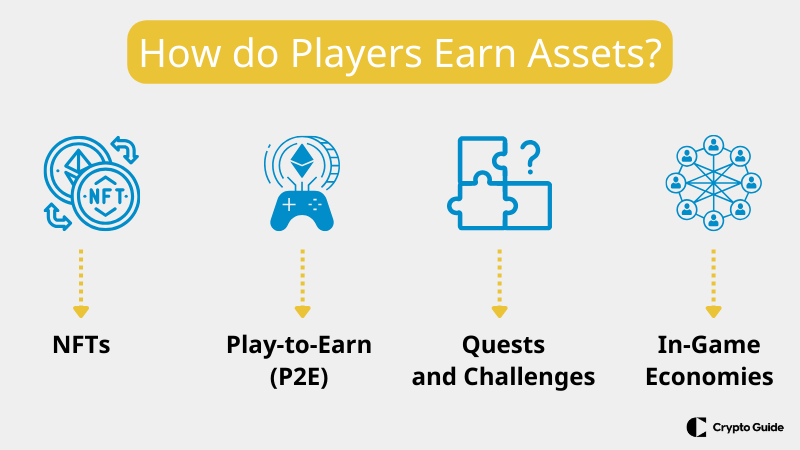
P2E (Play-to-Earn) Mechanisms
The P2E model allows players to earn cryptocurrency or NFTs by engaging in in-game activities, such as completing quests, winning battles, or leveling up their characters. These rewards can be traded or sold on cryptocurrency exchanges for real-world value, creating an opportunity for players to monetize their gaming activities.
Non-Fungible Tokens (NFTs)
NFTs are unique digital assets that represent in-game items, characters, or even entire virtual worlds. Players can own, trade, and sell their NFTs on NFT marketplaces, giving them true ownership and control over their in-game assets. NFTs can also be used to create in-game economies, where players can earn rewards by participating in various activities, such as farming, crafting, or trading.
Quests and Challenges
Many crypto games feature quests and challenges that reward players with cryptocurrency or NFTs upon completion. These quests can vary in difficulty and complexity, providing players with opportunities to earn rewards while exploring the game's world and engaging in different gameplay mechanics.
In-Game Economies
Crypto games often operate on decentralized blockchain networks, which create self-sustaining in-game economies. Players can earn rewards by participating in various activities, such as crypto mining games or trading. These rewards can then be used to purchase in-game items, upgrade their characters, or invest in other assets within the game's economy.
Blockchain Technology in Gaming
Blockchain technology is used to create a secure and transparent way for players to own, trade, and earn digital assets in games. This allows players to have more control over their gaming experience and potentially earn real-world money.
Crypto gaming is still developing, but it has the potential to transform the gaming industry. As the technology matures, we can expect to see more games that use blockchain technology and new and innovative ways to use blockchain.
Benefits Crypto Gaming
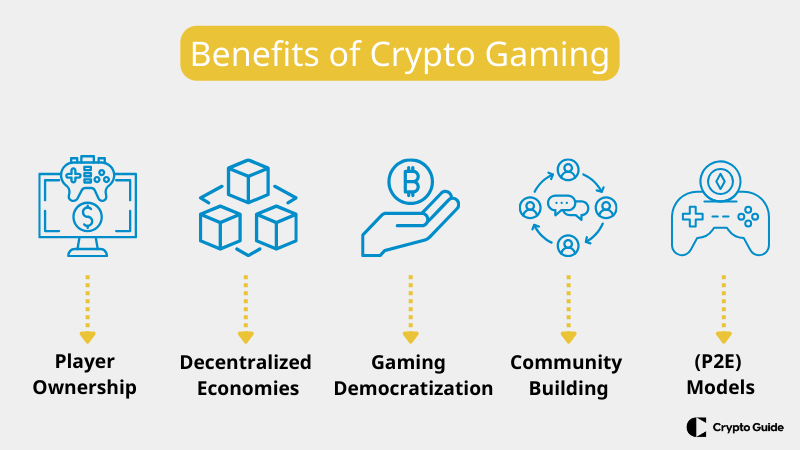
Enhanced Player Ownership and Asset Transferability
Crypto gaming introduces true ownership as NFTs, allowing players to control, trade, and lend assets for a more player-centric approach.
Decentralized Economies and Real-World Value
Crypto games on decentralized blockchains create self-sustaining in-game economies, with players earning cryptocurrency or NFT rewards for various activities that can be traded on exchanges for real-world currencies.
Play-to-Earn (P2E) Models and Reward Systems
Crypto gaming adopts play-to-earn (P2E) models, enabling players to earn real-world value through in-game activities, departing from traditional pay-to-play models.
Enhanced Engagement and Community Building
Blockchain integration motivates players to contribute to the game's economy, fostering a stronger community as they collaborate and compete for digital asset rewards.
Democratization of the Gaming Industry
Crypto gaming empowers players with more control over their experience and assets, potentially leading to a more equitable and transparent gaming landscape.
Limitations in Crypto Gaming
Crypto gaming is still in its development, and there are a number of limitations that need to be addressed before it can become mainstream. Here are some of the key limitations:
Barriers to Entry
One of the key challenges facing crypto gaming is the high barriers to entry. This is due to the technical complexity of blockchain technology and the need for players to have cryptocurrency wallets and understand how to use them. This can make it difficult for new players to get started, especially those who are not tech-savvy.
Crypto gaming also requires a significant upfront investment in order to purchase in-game assets, such as NFTs. This can deter players who are not willing to spend money on games, especially those who are not sure whether they will enjoy them.
Scalability and Game Lag
Another challenge facing crypto gaming is scalability. This is the ability of a blockchain network to handle a large number of transactions without becoming congested. If a blockchain network becomes congested, it can lead to transaction fees skyrocketing and transaction times increasing. This can make it difficult to play games, especially those that require frequent transactions.
Game lag is another issue that can affect the play to earn crypto games experience. This is because blockchain transactions can take time to be confirmed on the blockchain, which can cause delays in the game world. This can be frustrating for players, especially in fast-paced games.
Connectivity and Disconnected Ecosystems
Crypto games often require players to have a strong internet connection in order to play. This is because blockchain transactions are dependent on the network's consensus mechanism, which requires all nodes on the network to agree on the validity of each transaction. If a player's internet connection is interrupted, it can prevent them from making transactions or accessing their in-game assets.
Addressing These Challenges
Developers can make it easier for players to learn about and use blockchain technology. They can do this by providing clear and concise tutorials, creating user-friendly interfaces, and using more intuitive metaphors to explain blockchain concepts.
Developers can also reduce the upfront cost of playing by offering more free-to-play options and providing opportunities for players to earn in-game assets without having to spend money.
Blockchain networks can be optimized to improve scalability, such as by using sharding or layer 2 solutions. This can help to reduce transaction fees and transaction times, making it more affordable and convenient to play crypto games.
By addressing these challenges, crypto gaming can become more accessible to a wider audience and unlock a new level of innovation and engagement in the gaming industry.
Democratization of the Gaming Industry: Crypto gaming empowers players with more control over their experience and assets, potentially leading to a more equitable and transparent gaming landscape.
Barriers to Entry
One of the key challenges facing crypto gaming is the high barriers to entry. This is due to the technical complexity of blockchain technology and the need for players to have cryptocurrency wallets and understand how to use them. This can make it difficult for new players to get started, especially those who are not tech-savvy.
Crypto gaming also requires a significant upfront investment in order to purchase in-game assets, such as NFTs. This can deter players who are not willing to spend money on games, especially those who are not sure whether they will enjoy them.
Scalability and Game Lag
Another challenge facing crypto gaming is scalability. This is the ability of a blockchain network to handle a large number of transactions without becoming congested. If a blockchain network becomes congested, it can lead to transaction fees skyrocketing and transaction times increasing. This can make it difficult to play games, especially those that require frequent transactions.
lay experience in crypto games. This is because blockchain transactions can take time to be confirmed on the blockchain, which can cause delays in the game world. This can be frustrating for players, especially in fast-paced games.
Connectivity and Disconnected Ecosystems
Crypto games often require players to have a strong internet connection in order to play. This is because blockchain transactions are dependent on the network's consensus mechanism, which requires all nodes on the network to agree on the validity of each transaction. If a player's internet connection is interrupted, it can prevent them from making transactions or accessing their in-game assets.
Addressing These Challenges
Developers can make it easier for players to learn about and use blockchain technology. They can do this by providing clear and concise tutorials, creating user-friendly interfaces, and using more intuitive metaphors to explain blockchain concepts.
Developers can also reduce the upfront cost of playing by offering more free-to-play options and providing opportunities for players to earn in-game assets without having to spend money.
Blockchain networks can be optimized to improve scalability, such as by using sharding or layer 2 solutions. This can help to reduce transaction fees and transaction times, making it more affordable and convenient to play crypto games.
By addressing these challenges, crypto gaming can become more accessible to a wider audience and unlock a new level of innovation and engagement in the gaming industry.
The Future of Crypto Gaming
There are some future trends:
- Growing Popularity and Mainstream Appeal: Crypto gaming is gaining popularity globally and is expected to become more mainstream as technology becomes more user-friendly and industry challenges are addressed.
- Emphasis on Engaging Gameplay: Developers are moving beyond simply earning crypto and NFTs, focusing on creating innovative and engaging gameplay experiences, incorporating elements from traditional genres like RPGs, MOBAs, and MMOs.
- Decentralization and Player Empowerment: Inherent decentralization gives players more control over their gaming experience and assets, fostering player-centric economies and communities with active player involvement in decision-making.
- Cross-Chain Compatibility: Efforts are underway to address the current limitation of cross-chain compatibility, allowing players to transfer in-game assets between different blockchain networks, enhancing flexibility and versatility.
- Integration with Traditional Gaming: Crypto gaming is merging with traditional gaming markets, leading to hybrid games where players can use crypto assets to acquire items or services in traditional games.
- Continuous Innovation: Developers are consistently experimenting with new ideas, leading to potential advancements in game genres, monetization models, and gameplay mechanics within the crypto gaming industry.
- Environmental Sustainability: Growing awareness of the environmental impact of blockchain technology is driving efforts to use more energy-efficient networks and protocols within the crypto gaming space.
In summary, the future of crypto gaming looks promising with increasing mainstream adoption, diverse gameplay experiences, player empowerment, improved cross-chain compatibility, integration with traditional gaming, ongoing innovation, and a commitment to environmental sustainability.
Final Words on Crypto Gaming
Crypto gaming represents a new and exciting way to play games. It gives players more ownership of their in-game assets and empowers them to earn real-world money from playing games. This could change the gaming industry by putting players first and giving them more control over their experiences.
FAQ About Crypto Gaming
What is crypto gaming and how does it work?
Crypto gaming is a new paradigm that integrates blockchain technology into video games, allowing players to own, trade, and earn digital assets.
Can you really earn crypto by playing games?
Yes, players can earn crypto by playing crypto games through various mechanisms, such as completing quests, winning matches, or trading assets.
What are the risks of crypto gaming?
The risks of crypto gaming include regulatory uncertainty, technical complexity, potential for scams and market manipulation, volatility of cryptocurrency and NFT markets, and the environmental impact of blockchain technology.
How do crypto games make money?
Crypto games make money through in-game purchases, cryptocurrency sales, advertising, and sponsorships.
Is crypto gaming worth it?
Crypto gaming is a fun way for cryptocurrency enthusiasts to earn more, buy NFTs, and potentially profit. Play-to-earn games require initial investments, but players can increase earnings with more dedicated time.
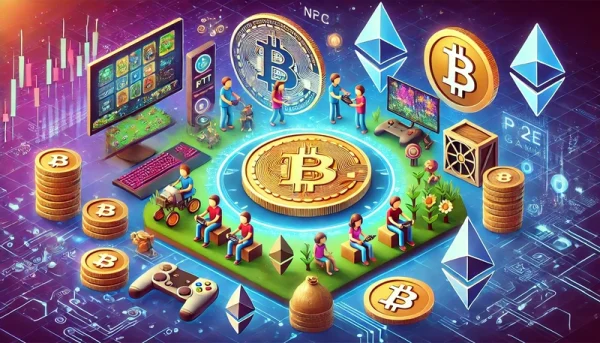
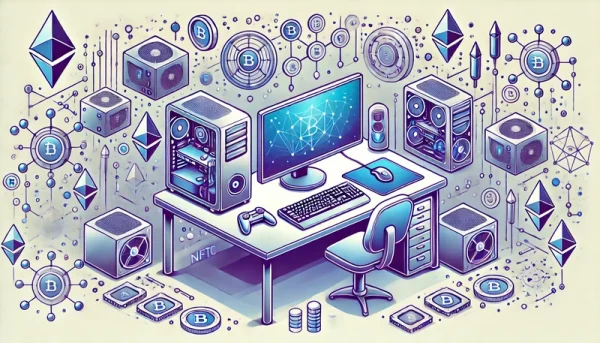
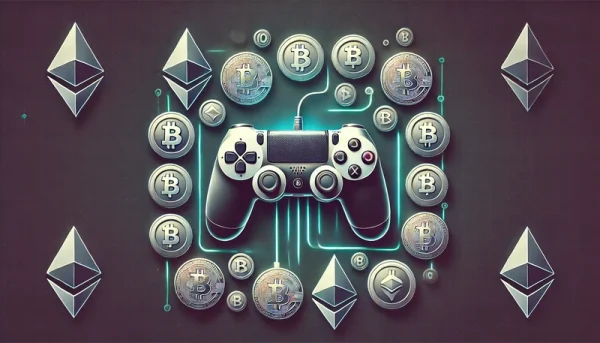

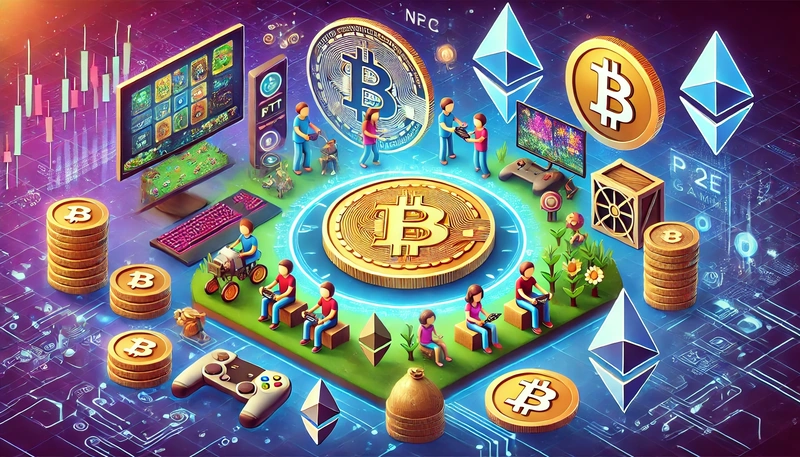
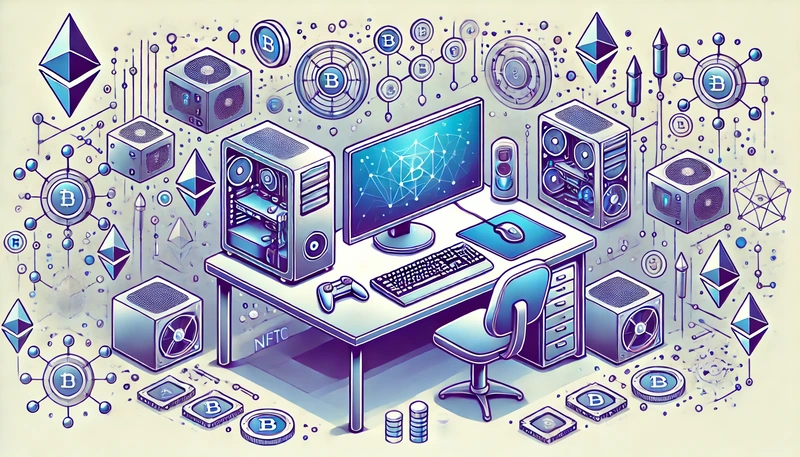
![Top 10 Crypto Games To Play in [year]](https://betoncrypto.io/app/uploads/2024/11/image1-2.webp)
